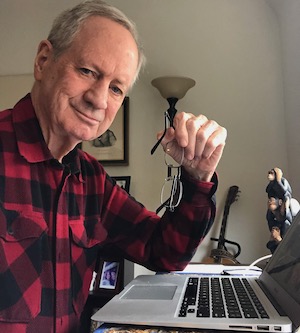Order McKenzie books online with a credit card
Bring Jamie to your school or district for a great workshop
Looking back at 40 years of innovationI began publishing this journal, From Now On, in the early 1990s soon after leaving the superintendency of a school district near Philadelphia. I called it “From Now On” as I had decided to spend the rest of my career as a thinker instead of fighting the battles that usually preoccupy a school superintendent.This journal was originally sent out to thousands of technology leaders who had subscribed to AppleLink, hoping to share exciting developments and possibilities as schools embraced new technologies. From the outset, FNO took a skeptical stance toward instructional software and focused attention primarily on using computers as tools for thinking and exploration.  “From now on” is a phrase that resonates with many folks electing to change course and explore new possibilities. It matched the mood of many educators who were eagerly exploring the potential of computers and new technologies to improve the learning experiences of students. My own enthusiasm for computers began in the 1970s when we purchased computers for the New Jersey elementary school where I was principal for six years. It was an exciting time full of great hopes and much pioneering. Following the lead of MIT’s Seymour Pappert, whose book Mindstorms promised radical improvement in student logical thought after learning to move turtles about with the LOGO programming language, we treated technological literacy and information literacy as twin horses pulling the educational chariot forward. Despite our hopes, we were never able to prove that Logo actually improved thinking. Perhaps my most influential article published during these early stages in 1994 by Kappan was “Grazing the Net: Raising a Generation of Free Range Students.” http://fno.org/text/grazing.html I was already growing concerned that the potential for improvement would be limited by a focus upon equipment rather than professional development. |
| It is time for educators to ask tough questions about this so-called electronic "miracle." Will we see dramatic increases in student achievement to justify this investment? In many cases — those districts which fail to clarify learning goals and fund professional development — the answer will be "No!" There is no credible evidence that networks improve student reading, math or thinking skills unless they are in service of carefully crafted learning programs which show students how to interpret information and make up their own minds. In the best cases - with the right program planning and robust professional development - schools will use these new tools and resources in ways which will improve student performance on high stakes state tests. The rich information resources to be found in cyberspace (the Internet) are both a blessing and a curse. Unless students have a toolkit of thinking and problem-solving skills which match the feasts of information so readily available, they may emerge from their meals bloated with techno-garbage, information junk food or info-fat. We must teach students to graze and digest the offerings thoughtfully in order to achieve insight. We must guide our students to become infotectives. What is an infotective? . . . a student thinker capable of asking great questions about data (with analysis) in order to convert the data into information (data organized so as to reveal patterns and relationships) and eventually into insight (information that may suggest action or strategy of some kind). An infotective solves information puzzles and riddles using all kinds of clues and new technologies. The problem-solving that often follows the detective work then requires synthesis (invention) and evaluation (careful choices from lists of options). An infotective is a skilled thinker, researcher and inventor. Unless we are connecting with the Internet for edutainment, student questioning must be intense before, during and after visiting cyberspace. We must teach students to start with what Sizer calls "essential questions" - the kinds of probing inquiries that might extend over a month or a lifetime - questions worth asking, that touch upon basic human issues - investigations that might make a difference in the quality of life - studies which might cast light in dark corners, illuminating basic truths. And then we must teach them how to conduct a thorough research study. Questioning persists throughout all stages of such a study. |
New technologies proved to be a mixed blessingSome four decades after purchasing my first microcomputers for my elementary school, it is difficult to find evidence that these tools led to an improvement in student thinking and writing. To the contrary, the National Assessment of Educational Progress (NAEP) has shown little improvement during those 40 years.See "What writing revolution?"  © iStock.com I remain convinced that this lack of success stems from a preoccupation with equipment and technologies rather than sound teaching strategies and professional development. As fixation on basic skills and high stakes testing turned out to be faux reform and the Pink Floyd song, "Another brick in the wall" seemed sadly current. As I close down this journal, the USA is struggling with a toxic political culture that threatens to replace the democracy with a dictatorship founded upon lies, propaganda and demagoguery. Logic and rational thought are in short supply. The internet has aided and abetted this dangerous lurch as the poverty of abundance has proven to be an ally to manipulative leaders. Social media have spread lies and falsehoods far and wide, undermining the foundations of our democracy. The promise of the Internet to breed and foster an enlightened citizenry failed to become a reality. Indeed, what we are seeing is a drift toward mob rule and ignorance. Civic virtue is sadly in short supply. Citizenship education deserves a hefty revival. While this is the last article to be published for FNO, I will continue to publish articles for The Question Mark and will post new poetry and fiction on the FNO Web site. |
|
Written materials, art work and photography on this site are copyrighted by Jamie McKenzie and other writers, artists and photographers. Written materials on these pages may be distributed and duplicated if unchanged in format and content in hard copy only by school districts and universities provided there is no charge to the recipient. They may also be e-mailed from person to person. All other uses, transmissions and duplications are prohibited unless permission is granted expressly. Showing these pages remotely through frames is not permitted. FNO is applying for formal copyright registration for articles.
|
Network 609
Denver, CO 80220
Inquiries via email please

